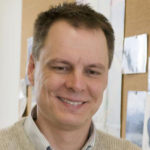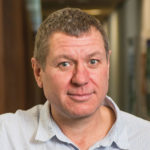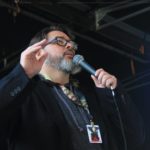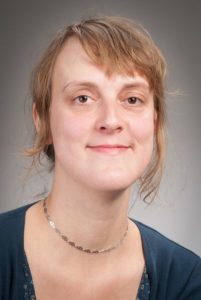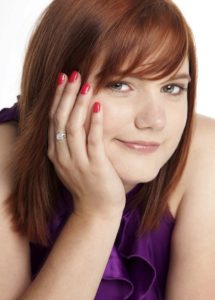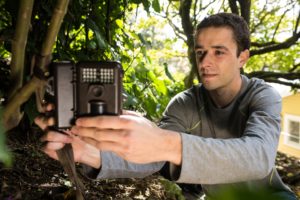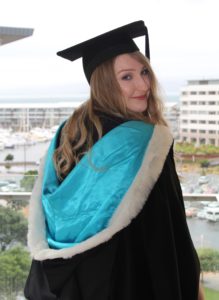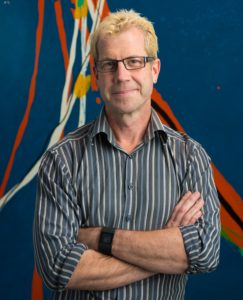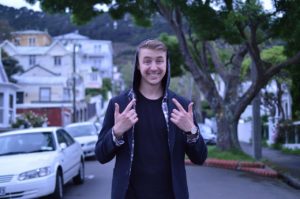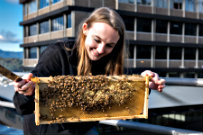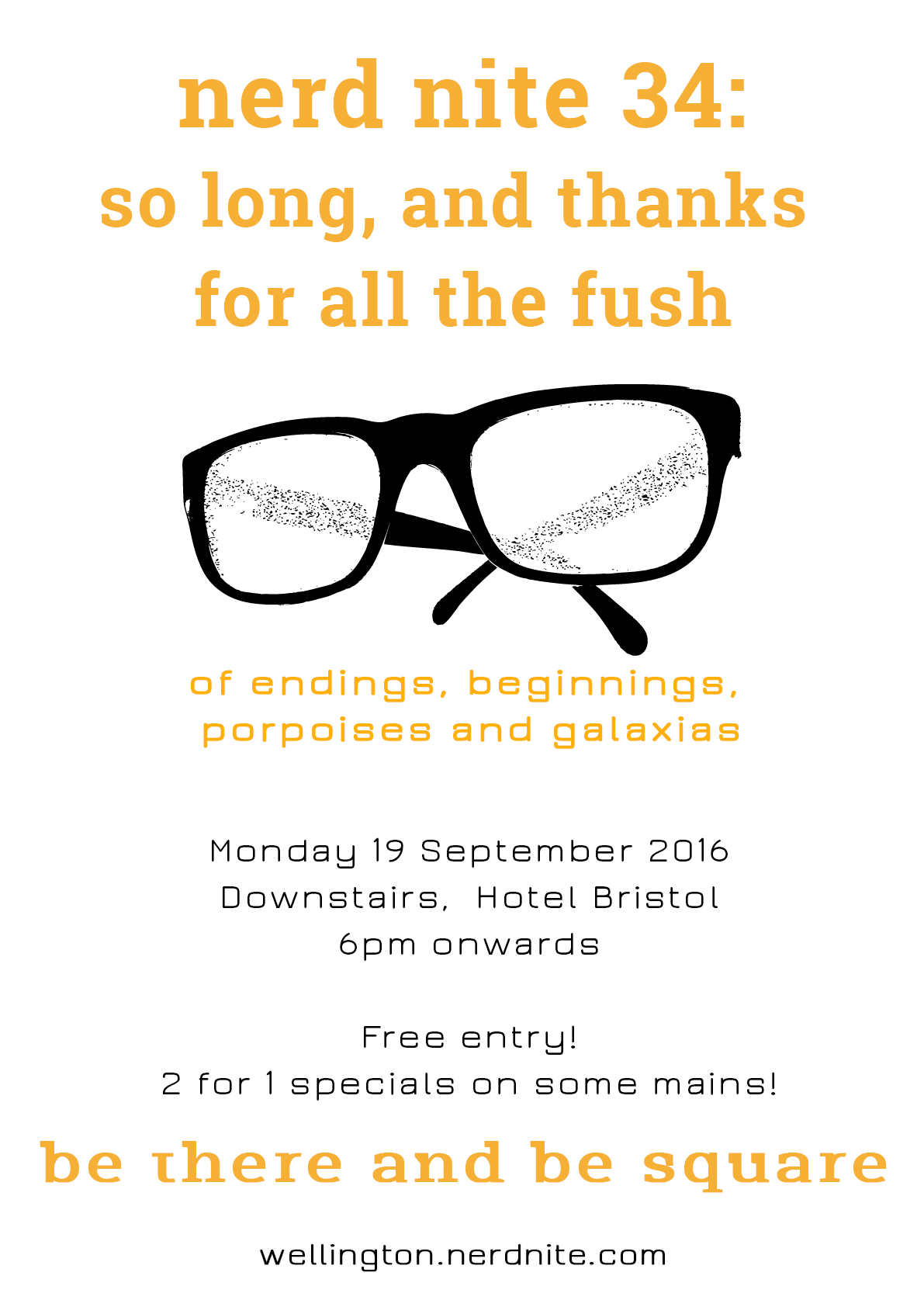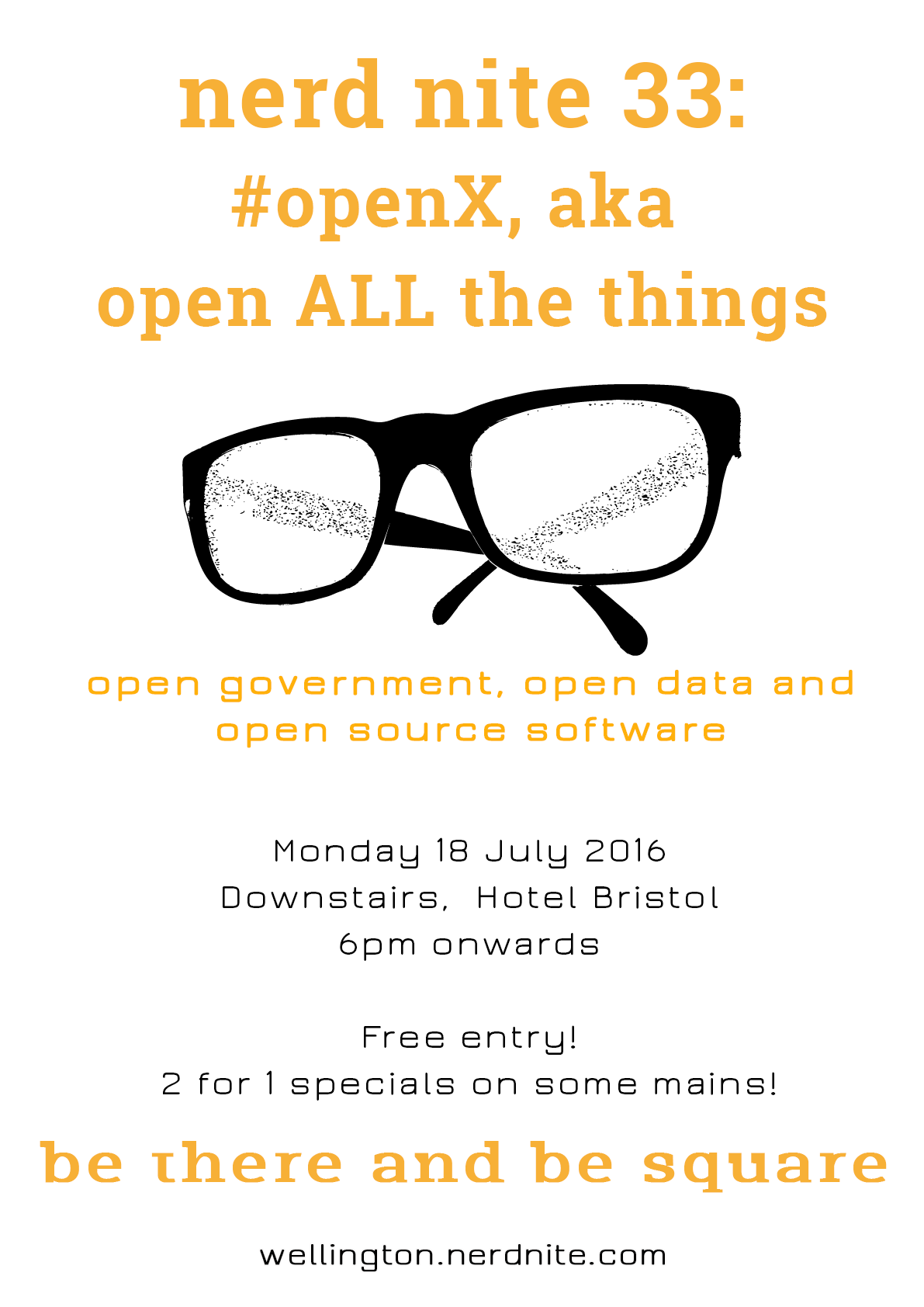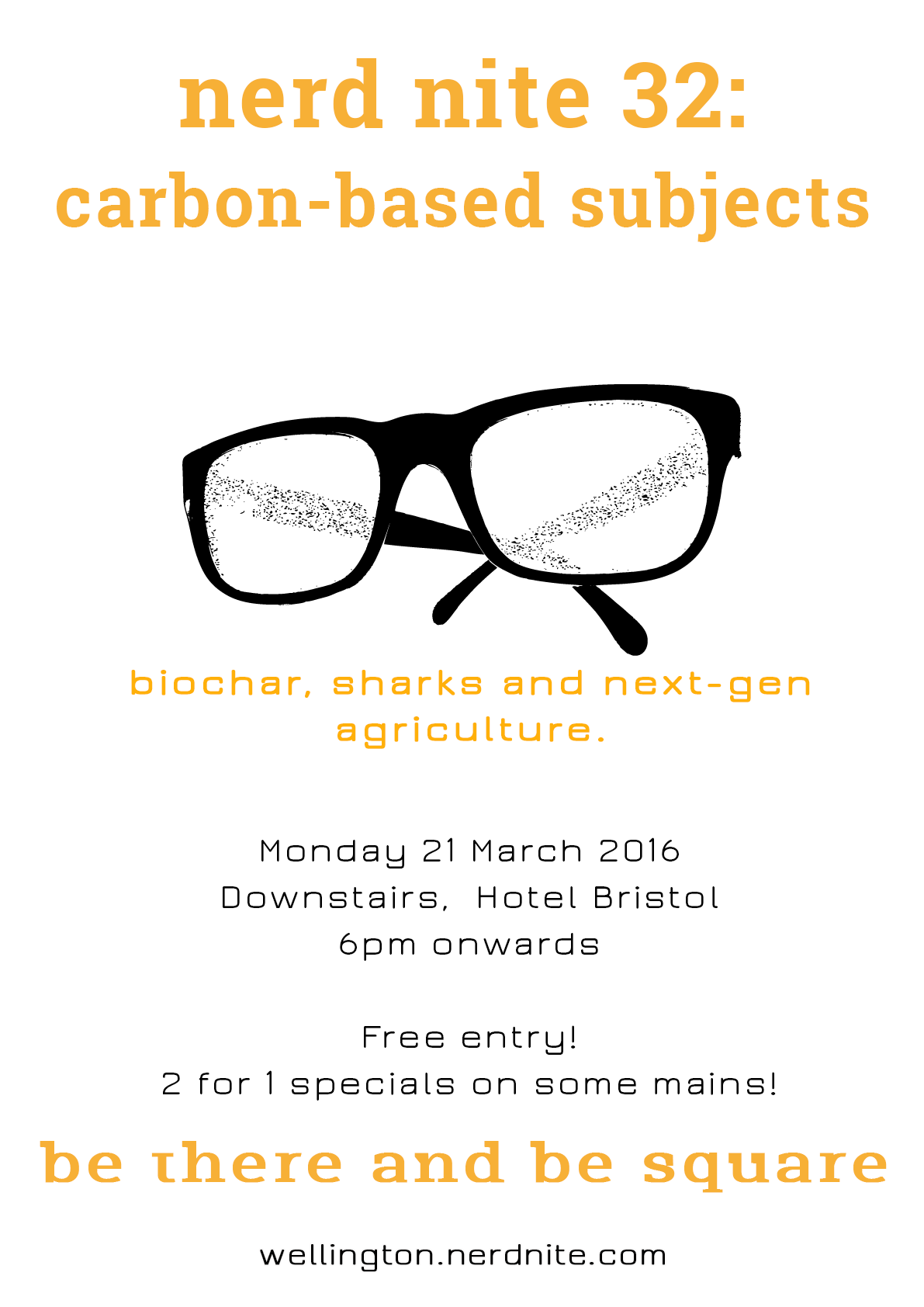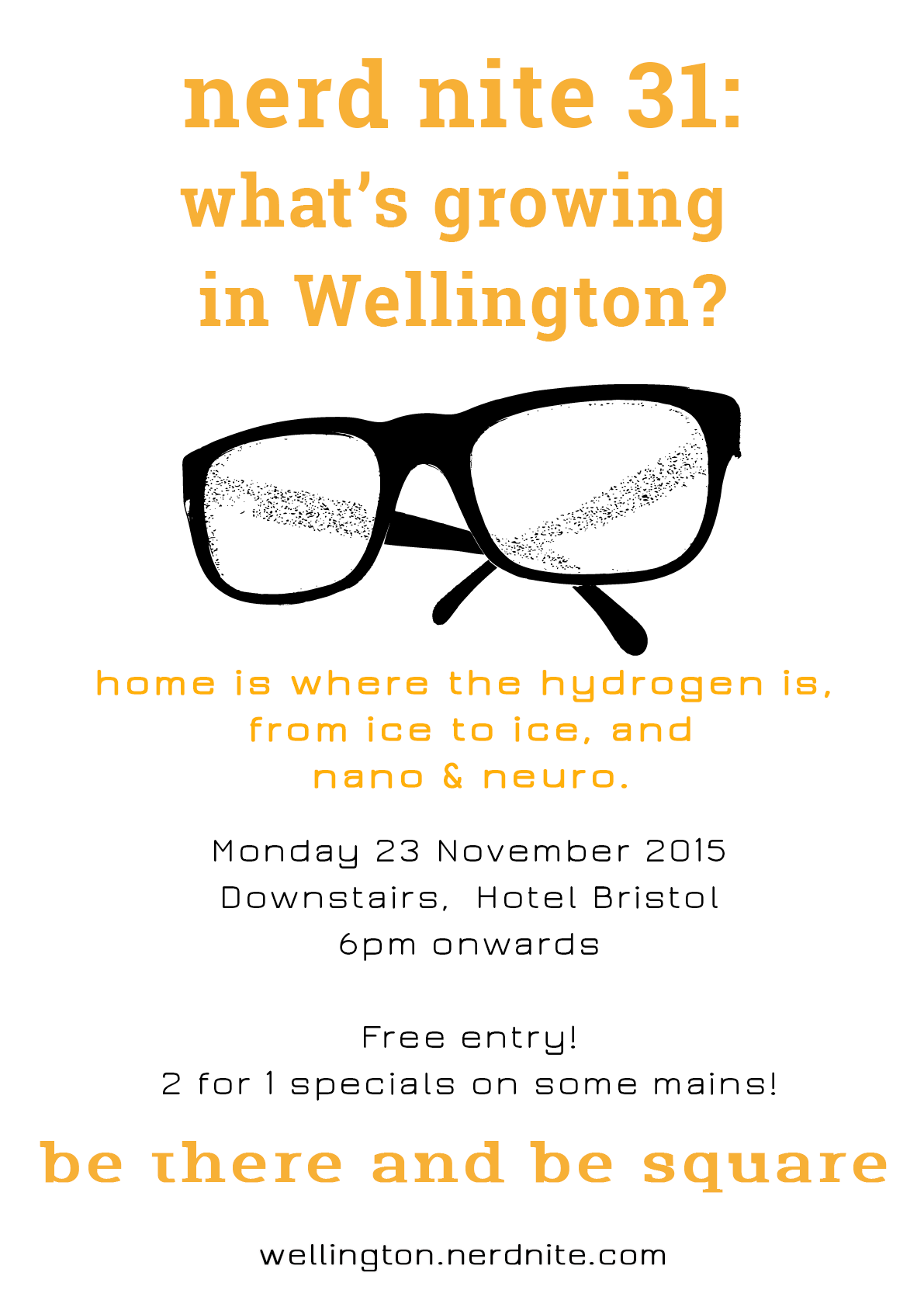Nerd Nite #39: Lets Get Political
The Essentials:
- Date: Wednesday 20th September 2017
- Time: 6pm (for 6:30pm start – get there early for food and a good spot)
- Venue: Meow Cafe & Bar (9 Edward Street)
- Cost: $5 (tickets via Eventfinda or on the door)
Speaker details (in no particular order):
What goes wrong with political polls and referenda?
When the public are asked questions about what they think, the results can be unexpected. What goes wrong with political polls and referenda? Why are they sometimes such bad barometers of public opinion? With our own election mere days away, can we believe what we’re hearing in the media about the way New Zealanders are going to vote?
Richard Arnold is a lecturer and researcher in Statistics at Victoria University of Wellington and is also the election night forecast statistician for TVNZ. He will discuss some of the more and less obvious pitfalls of opinion polling.
What’s the deal with climate data?
How come climate scientists can be confident that climate change is caused by greenhouse gas emissions, and why doesn’t our good scientific understanding of the problem translate into effective global action?
Dave Frame is a lecturer and researcher in Climate change and Policy at Victoria University of Wellington. His talk will cover the gambit of physics, game theory, and technology as applied to climate change modeling.
I have the solution!
NZ politics is in turmoil. None of the current political parties can be trusted to sit the right way on a toilet let alone govern a country. What NZ needs is a benelovant dictator and there is only one person who can fill that role and that person is … (you need to come along to find out).
Damian Reid was born at an early age and will die eventually. In the mean time he keeps busy as MC for Armageddon, spending time with his dog and plotting to take over the world if he can just find his lucky socks.
Nerd Nite #38: It’s not too complicated…
The Essentials:
- Date: Tuesday 30th May 2017
- Time: 6pm (for 6:30pm start – get there early for food and a good spot)
- Venue: Leroy’s Dive Bar (top of Plimmer Lane/bottom of Plimmer steps)
- Cost: Free/Koha
Speaker details (in no particular order):
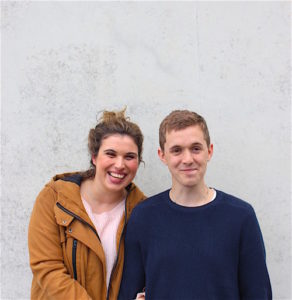 It’s all coming up apples
It’s all coming up apples
Sean Manning
Steel Press Cider is a boutique cider brewery based here in Wellington. Formed out of the complementary desires of a) creating a cider that was more complex and flavourful than what was otherwise available, and b) impress a girl. Sean (one of the founders) is going to talk to us about the history of cider and how to get it to taste the way it does*
*there will be tastings
Calculus secrets they didn’t tell you at school
Maor Ben-Shahar
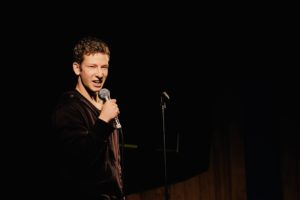 Why is calculus useful? what is it even about? Calculus is completely natural to us, statements such as “the more rabbits there are the more they will reproduce” are primary examples of our brains doing calculus without us even knowing. In this talk we will develop the motivation for numerical methods to model many things; from the cooling of hot soup to the propagation of light pulses in optical fibers.
Why is calculus useful? what is it even about? Calculus is completely natural to us, statements such as “the more rabbits there are the more they will reproduce” are primary examples of our brains doing calculus without us even knowing. In this talk we will develop the motivation for numerical methods to model many things; from the cooling of hot soup to the propagation of light pulses in optical fibers.
The talk will not be algebra on top of algebra, all calculus can be described (but not solved) with pictures 🙂 The focus is the methods of calculus, as opposed to the results. None of the results are actually “exciting” or “revolutionary to science”, they just produce cool graphs. The algebra is already done for you – you just need to soak up math pictures!
Maor is a graduate student at Victoria university. He studies theoretical physics and applied maths, and since he is a terrible student he is frequently seen at bars performing stand up comedy.
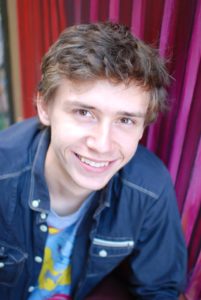 The Artistic Theory of Internet Memes
The Artistic Theory of Internet Memes
Severin Gourley
What is lol cat? Can something ever be considered dank? Who even is this 4chan? Young person in the new millennium Severin Gourley talks about the most pervasive form of modern art: internet memes. This talk touches on role of the artist in the memes they create, the various subcultures memes have created and memetics/the internet as a whole.
Severin is a stand-up comedian and philosophy graduate who has professionally been a young person for many years.
Nerd Nite #37: Contemplating Recognition
Many more details to come – but in the interim the essentials are:
- Date: Tuesday 14th March 2017
- Time: 6pm (for 6:30pm start – get there early for food and a good spot)
- Venue: Leroy’s Dive Bar (top of Plimmer Lane/bottom of Plimmer steps)
- Cost: Free/Koha
Speaker details (in no particular order):
You know nothing about face recognition, Jon Snow
There are large individual differences in people’s ability to recognise others’ faces. While some people struggle to recognise their own relatives, others can recognise strangers on the street that they haven’t even met. However, current tests used in the lab – or in the court! – to assess people’s face recognition skills have severe flaws that may conceal how bad/well people actually perform in their daily life. Christel will describe a recent study that she conducted on Game of Thrones fans to assess and challenge people’s real-life face recognition skills. Being super good at face recognition might not be what you think, Jon Snow!
Christel Devue, originally from Belgium, is a Lecturer in Psychology at Victoria University of Wellington. She studies visual perception, attention and facial recognition, and how they are affected by emotion or individual experience. She also has a passion for visual arts, and delights in trying to depict people or landscapes’ singularities.
Do You Wanna Piece of Me?
Donating your organs after death is one thing, but ever wondered what it’s like for a live donor? This talk is a no punches held account of the steps taken in, quite literally, giving a piece of yourself away. Speaking from her own experiences as a live donor, Hayley gives us a crash course in what happen when you say ‘yes’… from the battery of tests and what they are for, to weird stuff your body does after keyhole surgery. Speaking from the heart (sadly she can’t donate that yet), her friendly optimism may steal yours.
Hayley Webster is a Wellington based Producer, Comedian and Improviser.
Using remote cameras to spy on Wellington’s wildlife.
While the use of remote cameras for studying wildlife have increased globally, this monitoring method is not commonly used in urban areas. In 2014, a group of researchers from Victoria University started to deploy remote cameras within Wellington City to study the population dynamics of different species, including possums, stoats and rats. After one year, they collected over 100,000 photographs. The amount of data collected was so extensive that researchers needed help from the community. A citizen science website (identifyanimals.co.nz) was launched to help the researchers identify the animals recorded in the photos. Since then, citizen scientists have already classified over 60,000 photographs. This presentation will cover some of the anecdotes and lessons learnt from combining citizen scientists and remote cameras to research urban wildlife.
Victor Anton, originally from Spain, is a PhD student at Victoria University. In 2014, Victor completed his Master of Science in Ecological Restoration and started to use novel technologies and citizens science to study New Zealand ecology. Last year, he was nominated for Wellingtonian of the year.
Nerd Nite 36: Ch-ch-ch-ch-Changes
Many more details to come – but in the interim the essentials are:
- Date: Tuesday 31st January 2017
- Time: 6pm (for 6:30pm start – get there early for food and a good spot)
- Venue: Leroy’s Dive Bar (top of Plimmer Lane/bottom of Plimmer steps)
- Cost: Free/Koha
Speaker details (in no particular order):
A Quest for New Markers
Acute Coronary Syndromes (ACS) result in significant morbidity and mortality, accounting for approximately half of all deaths due to cardiovascular disease. Accurately predicting high-risk patients at danger of recurrent ACS, stroke or death is extremely challenging, and biomarkers are commonly employed as tools in order to risk-stratify patients. It has been hypothesized that using a multi-marker inflammatory panel consisting of pro- and anti-inflammatory markers would provide independent prognostic information in an ACS population, and as such could provide a better model for predicting inflammatory mediated risk following a heart attack. This talk will also delve into the sometimes less-than-ideal realities of being a postgrad student – a tight time frame, a tight budget, and things just not working out…
Evie Templeton is a master’s student at Victoria University of Wellington, who is currently completing the last month of her Master of Clinical Immunology.
The Secret Life of Otters.
Perhaps one of the most loved members of the Mustelidae family are the adorable otters. This talk will briefly overview some of the interesting features of the thirteen accepted otter species (plus delve a little in to the possibility of a mysterious ‘missing 14th’ species). In addition, we will explore some of the behavioural characteristics of the more commonly studied species and the challenges that arise from understanding another species from an inescapably anthropomorphic perspective (i.e. we really have no idea what is going on).
Dave Harper is a Professor in Psychology and Dean of Science at Victoria University of Wellington. Although he has moved to the dark side of University administration, the academic interests of his past life have encompassed such areas as behavioural pharmacology, mathematical modelling of basic behavioural processes and understanding the cognitive processes of non-human animal species.
My Great-Great-Great-Great Grandparents Were Aliens
Nerd Nite 35: Discovering Zombies
On uncovering and creating alternate forms of “life”.
As usual:
- VKs (Dixon Street)
- 6pm (speakers to start at 6:30pm)
- Tuesday 22 November 2016.
- One more special guest.
Fighting the Outbreak
The fragile honey bee has yet another enemy. This time it’s another 6-legged hymenopteran cousin – ants. Invasive Argentine ants (Linepithema humile) are responsible for widespread decline of honey bee colonies across the warmer parts of the North Island. These ants invade and infest bee hives, ransacking the bees of their honey stores and eating their brood. In studied hives over a number of apiary sites, hive survivorship decreased from 85% in non-infested hives to 50% in sites infested with ants over a six month period. Moreover, these ants may be spreading viruses to bees. Bees in these hives were infected with Deformed wing virus, a key driver of honey bee colony losses around the world. Average Deformed wing virus infection levels were always higher where Argentine ants were present. Bees in apiaries with ants acquired viral infections up to 220-fold higher than the maximum infection in apiaries without ants. Argentine ants appear to be contributing to honey bee hive collapse through the combined effects of predation, hive robbing, and disease. Only problem is, there’s no way to get rid of them…
Jess Russell is a master’s student at Victoria University of Wellington who is passionate about saving the bees by injecting stuff into them. Good times.
Hacking the IoT:
Philip & Jessie
g0ldfisk & follower recently talked about reverse engineering internet
connected adult toys at the DEF CON computer security conference in
Las Vegas. Come along to learn more about the privacy concerns related to your
Internet of Things (IoT) devices (adult or otherwise) and the
importance of asking what your connected device is saying about you
behind your back.
Just One More Level
Josh Davies
Josh Davies is a writer and comedian. His talk is all about video games and the obsessions and addiction they cause.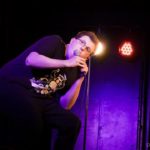
Discovering a zombie volcano (this talk has been rescheduled due to the quakes)
Ian Hamling
The surface of our planet is constantly deforming and changing shape in response to the build up of tectonic strain before an earthquake, the movement of magma in the crust or the removal of resources such as water, oil and gas. Regardless of the cause, accurate measurements of how the surface is deforming provides critical insights into subsurface processes all of which can have large impacts on society. Since the launch of ERS-1 in the early 90’s, Interferometric Synthetic Aperture Radar (InSAR) has become a widely used technique for measuring deformation of the Earth’s surface. In this talk he will present a range of InSAR observations acquired over the Taupo Volcanic Zone associated with a variety of magmatic processes including the cooling and contraction of magma at depth and the inflation of a new magma chamber beneath the Bay of Plenty.
Ian Hamling is a geophysicist working for GNS Science. He completed his PhD in 2010 at the University of Leeds, UK, investigating continental rifting in Ethiopia. His main interests involve the use of satellite radar data to measure how the surface of the earth deforms as a result of volcanic and tectonic processed.
As always, NNW is free and open to everyone*. Bring your friends and family.
* Who behaves themselves, of course. Naughtiness will be stamped on. Hard.
nerd nite 34: so long, and thanks for all the fush
Join us for the end of one era, and the start of another 🙂
As I mentioned in the previous newsletter, I’m proud to be handing the reins over to the community after more than 6 years as founder, organiser and host of Nerd Nite Wellington (the Southern Hemisphere’s first chapter).
The fabulous Dell Mitchell will be taking over from me, and I can’t wait to introduce her to you!
We’ve got 2 great speakers lined up for the evening – if you’d like to fill the 3rd spot, or say something, please do give me a shout.
RSVP on Facebook by clicking on this link
We’ll be celebrating in a watery fashion at:
- Hotel Bristol (Cuba Street)
- 6pm (speakers to start at 6:30pm)
- Monday 19 September 2016.
——
Do porpoises dream of sheepshead fish?
Andrew Wright
All animals studied to date sleep. However, cetaceans (whales, dolphins and porpoises) studied thus far engage in the unusual practice of unihemispherical sleep. This allows half of their brain to sleep at a time. Most study of sleep in cetaceans has occurred in captivity. However, tagging devices deployed on wild animals have now developed to the point where it is possible to investigate sleep in the wild. Stereotyped diving behaviour was identified in tag data from harbour porpoise that was deemed likely sleeping periods. Approximately half of these dives were silent – unusual in a species thought to echolocate continuously. The porpoises were also much less active during these dives, which were almost always between 6 and 8 m of depth. If the data are representative, harbour porpoises may spend around 5 %, but up to 10 %, of their time (near) silent and potentially sleeping. This finding has implications for research studies using passive acoustic monitoring techniques, as well as efforts reduce incidental bycatch in fisheries.
The data does not yet provide an indication of what porpoises actually dream about.
Andrew Wright is a British marine biologist that has been working on the science-policy boundary around the world for over a decade. His experiences have led him to champion a better communication of science to policy makers and the lay public. His research has included analyses of sperm whales and harbour porpoise bioacoustics, the impacts of noise on various marine mammals and an exploration of how stress responses are reflected in cetacean skin. He is also investigating sleeping behaviour in harbour porpoise and bottlenose dolphin – some of which he is presenting today. Andrew is currently working to update the New Zealand Code of Conduct for Seismic Surveys for the Department of Conservation. He is also spearheading efforts to bring more marketing techniques into conservation outreach, including introducing conservation to sci-fi fans through the Facebook page Vaquita Are Browncoats.
—
Fish, rock, space & time
Eric Edwards
Alpine galaxias are an inter-mountain fish native to rivers of South Island basins and valleys east of the Main Divide. They live in rivers from Marlborough to Southland but are absent from the centre of Otago. There is no certain explanation based on hard evidence to explain this absence. But what evidence there is from geography and geology makes a good story.
Eric Edwards is an entomologist (& former freshwater biologist) based in Wellington. He works on pest control & ecosystem conservation for Department of Conservation and among Pacific Islands. For over a decade he has been involved in assessments for land protection in the South Island high country.
——
As always, NNW is free and open to everyone*. Bring your friends and family – someone to share a meal with, definitely, as there are some great 2 for 1 specials on the menu.
* Who behaves themselves, of course. Naughtiness will be stamped on. Hard.
—–
I’ll still be around! But I’ll be focusing on other projects, including working to create and encourage a civic technology movement in New Zealand and taking over as national coordinator for GovHack NZ. For those who were at Nerd Nite #33 – that’s the sort of thing I’m doing.
- OpenCiv NZ (aka “Flaxroots”) – civic technology in New Zealand
- We have a meetup on Sunday afternoon – check website for details if you’re keen on coming.
- GovHack NZ – Australasia’s largest open government/open data hackathon
nerd nite 33: #openX, aka open ALL the things
We’re baaaaack! And we have a super-special edition of Nerd Nite Wellington lined up for you.
Ahead of NZ’s largest hackathon – focusing on open data and open government, no less – GovHack, and the Open Source//Open Society (un)conference and related events in July/August, we thought we’d dive into “open”. But what does it all mean?
We’ve got the brilliant Steven Price, Rochelle Stewart-Allen and Cam Findlay talking all things open government, open data and open source.
RSVP on Facebook by clicking on this link
We’ll be opening up at:
- Hotel Bristol (Cuba Street)
- 6pm (speakers to start at 6:30pm)
- Monday 18 July 2016.
It’s going to be AWESOME.
- Find out more about GovHack NZ (9 locations across NZ, free event, 29-31 July)
- Find out more about OS//OS (Wellington, multiple events in July/August)
——
Lineup
——
On Open Government (aka #opengov)
Steven Price, VUW
Steven will briefly describe the Open Government Partnership and outline his report on New Zealand’s first OGP action plan (it wasn’t complimentary). He’s also happy to take questions on our official information laws.
Steven Price is a Wellington barrister and adjunct lecturer in media law at Victoria University of Wellington. He’s the author of “Media Minefield: A Journalists’ Guide to Media Regulation in New Zealand”, and blogs at medialawjournal.co.nz. His biggest claim to fame is as Nicky Hager’s lawyer.
Steven is also the New Zealand reporter for the Open Government Partnership, an international initiative that promotes transparency, accountability and citizen participation in government.
On Open Data (aka #opendata)
Rochelle Stewart-Allen (@RStewartAllen)
The real value of open data comes when people outside those who collected it take those raw datasets and analyse them, visualise them, track trends, build new apps, or find new and innovative solutions to old problems. What makes open data significant is not that the data is available, it is that the raw material becomes a tool to engage people. It is a tool for participation. Rochelle will provide an overview of how open data is changing the world, where to find it, and ways the data is being used to drive new social and economic outcomes.
With a passion for transparency, accountability and justice, Rochelle has long been a firm believer in open government and open education. As Senior Advisor for the cross-government Open Government Information and Data Programme at Land Information NZ, Rochelle’s focus is on driving active engagement between government, business and civil society about open data.
On Open Source (aka #opensource) or, “Open source: More than just free code”
Cam Findlay, SilverStripe (@cameronfindlay)
Open source is sometimes misunderstood as a concept. While we often think of it as software and code, it’s a much wider topic. Open source extends into many areas of discussion. From peer production, copyright and licensing, communities to the failings of the English language and much more. This talk will introduce you to the multifaceted world of open source. You’ll pick up terminology, ideas and examples to help you explore the open source concept as a part of an open culture.
Cam’s been working with open source software for over a decade across various technical projects and roles. He’s also recently been back to study the social aspects of the tech business and communities as social knowledge systems at Massey University. He describes himself as a socio-technologist, and his unique mix of technical-plus-people has seen him involved in online education ventures, open source community management at SilverStripe and advising the New Zealand Government on open source software policy.
Cam has a keen interest social learning, communities of practice and informal organisational structures that foster effective collaboration and peer production.
——
As always, NNW is free and open to everyone*. Bring your friends and family – someone to share a meal with, definitely, as there are some great 2 for 1 specials on the menu.
* Who behaves themselves, of course. Naughtiness will be stamped on. Hard.
nerd nite 32: carbon-based subjects
It’s on like an on thing, ladies and gentlenerds!
For this, our first Nerd Nite Wellington of 2016, we’ve got a treat in store for you 🙂
As usual, it’ll be going down at:
- Hotel Bristol (Cuba Street)
- 6pm (speakers to start at 6:30pm)
- Monday 21 March 2016.
More details forthcoming soon, but in the meantime here’s a taster!
A decade of NIWA research on great white sharks
Warrick Lyon, NIWA
In the words sent from Warrick’s latest time at sea: “what we thought at the start of the naughty’s, what we know now, and how we worked that out.”
Warrick Lyon is a shark researcher at NIWA.
Biochar: how to have fun burning stuff while helping solve climate change (and growing great veges)
Richard Self, Te Aho o Te Kura Pounamu, @Metrosiderous
- What is biochar?
- How does it enhance soil fertility?
- How can we make it?
- How can burning stuff actually help climate change?
Rich is a self-confessed Gardener, Tree Geek and Biochar Enthusiast.
Next-gen soils, and fixing our food webs
Benoît Szegedi
How can one use parametric design and additive manufacturing to produce optimal ground cover solutions for to vegetable/orchard production, or land restoration?
Ben will talk combining agro-industrial wastes and biotechnologies to induce soil (and so food web) regeneration.
Ben is a microbiologist and designer researching the interactions between soil makeup, teeny critters and new fabrication techniques.
Get involved!
After more than 30 NNWs, I thought it would be great to run a little survey to find out what you’ve enjoyed so far, what you might like to see in future, and a bit about you.
Fill out the first ever NNW survey
Also, I’m in the market for an organising team. Nothing huge, of course, but it would be great to have help in organising NNW, keeping it awesome, and hopefully helping it not only survive, but thrive!
If you’d like to be a part of my team, you can email me directly or, even better, you can fill out the survey. There’s a question in there all about this 🙂
Fill out the first ever NNW survey
nerd nite 31: what’s growing in Wellington?
As usual, the awesome will be taking place at:
- Hotel Bristol (Cuba Street)
- 6pm (speakers to start at 6:30pm)
- Monday 23 November 2015.
As always, seating may run out, so don’t rock up at 6:30pm expecting to get a decent seat – or one at all.
What’s growing in Wellington?
Wellington Emerging Career researchers, @wtn_emcr
According to 2013 census data, Wellington has the highest percentage of people with university degrees of any region of New Zealand.
At this awesome edition of Nerd Nite Wellington, we’ll be featuring 3 emerging scientists from GNS, NIWA and Victoria University geeking out about their fields of expertise. Covering ocean physics, high temperature superconductors and understanding geothermal systems,Wellington’s wonderful young researchers will share their passion for their subjects and perhaps show you their science from a brand-new perspective.
Wellington is home to a plethora of research institutions including GNS Science, the Malaghan Institute for cancer research, NIWA, ESR and the MacDiarmid Institute. To name but a few. So one could reasonably expect that interesting scientific research happens here. Some of the city’s most interesting research, however, is being done by early career researchers (ECRs).
And this looks set to continue with support for ECRs central to the new Science for Technological Innovation national science challenge, presented as a cost-effective way of growing NZ’s creative capital. WECR (Wellington Emerging Career Researchers) is a small group representing the hundreds of scientists in Wellington within 10 years of completing their doctoral work.
—
LINEUP (note: speakers won’t necessarily appear in this order)
—
Home is where the hydrogen is
Lucy Stewart, GNS
Lucy will talk about correlating the presence of methanogenic microbes and hydrogen at hydrothermal vents, and how vents are useful as analogue study sites for astrobiology. She’s going to get into what hydrothermal vents are and where they’re found; how and why they support life; why methanogens are a particularly interesting kind of microbe at vent sites; and what her PhD research tells us about methanogens at hydrothermal vents, and how we can apply this knowledge to astrobiology and looking for life on other worlds.
Lucy Stewart completed her BSc(Hons) in microbiology at the University of Canterbury and her PhD in microbiology at the University of Massachusetts, Amherst, partially supported by a NASA Earth and Space Science Fellowship. She has returned to New Zealand to study the microbiology of Kermadec Arc volcanoes at GNS Science.
–
From ice to ice: ocean interactions with Antarctic ice
Natalie Robinson, NIWA
In an apparent paradox, sea ice around Antarctica has been expanding, despite forming in an ocean that is becoming warmer. Part of the answer to this puzzle lies in the effect that the warming ocean is also having on Antarctic ice shelves – the floating extension of the land-based ice sheet. Melting of ice shelves by the ocean creates water that becomes supercooled as it rises towards the surface. This very cold water contributes to thickening of sea ice, especially near to the coast. In this talk I will highlight some of the weird phenomena we have observed, and describe how they relate to the bigger climate picture in a warming world.
Natalie completed her MSc (VUW) and PhD (Otago) degrees in Antarctic Oceanography, and has recently been made part-time permanent at NIWA with a similar focus. She’s also diverged into other multi-phase systems, looking at explosive depositional processes and turbulence from fish in cages. With 3 young children, leisure time no longer exists, but in a previous life she enjoyed playing piano, long-distance running, salsa dancing and circus training.
–
Nano & neuro
Leo Browning, VUW
—–
As always, NNW is free and open to everyone*. Bring your friends and family – someone to share a meal with, definitely, as there are some great 2 for 1 specials on the menu.
* Who behaves themselves, of course. Naughtiness will be stamped on. Hard.
